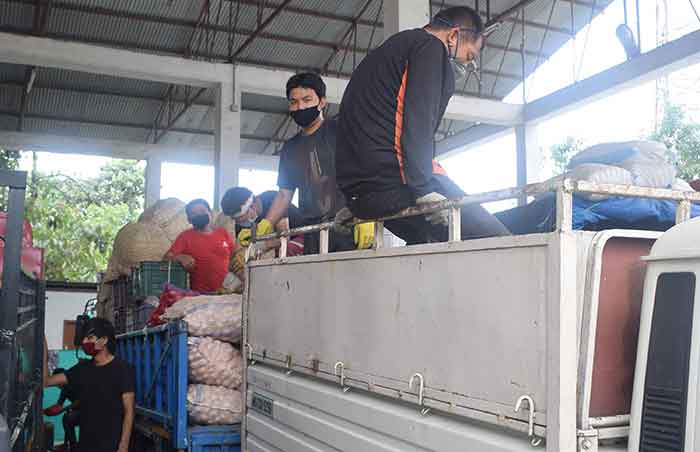Rajesh Rai | Phuentsholing
Although the recent news of positive Covid-19 cases in Falakata, India has generated some fear among people, importers continue to import vegetables and fruits.
But they observe utmost prevention measures and care.
Falakata, an Indian town from where Bhutanese imports vegetables and fruits, is about 60km away from Phuentsholing.
Recently, Indian media reported that four people were tested positive for Covid-19 in Falakata. They had returned home from different states after completing quarantine periods.
On an average, every day, about 25 Indian vehicles enter Phuentsholing with vegetables and fruits.
Starting April 15 until May 19 this year, record with BAFRA office in Phuentsholing shows that the country imported 536 truckloads of vegetables and fruits. This includes 1,290.34 metric tonnes (MT) of vegetables, 155.05MT of fruits, and 72.2MT of areca nut and betel leafs.
As part of the prevention procedure, vegetable importers first register the details of the vehicle number and driver with Bhutan Agriculture and Food Regulatory (BAFRA) office in Phuentsholing.
BAFRA then forwards the details to Road Safety and Transport Authority (RSTA) from where the information is passed to the Covid-19 Task Force. This information is managed before the Indian vehicle from Falakata brings in the produces to Phuentsholing.
While entering Bhutan, Indian trucks are given a token number before entering the port. When their turn arrives for transshipment, the Bhutanese vehicle is allowed to enter the port. Only one person is allowed to enter into the port. The Bhutanese and the Indian individuals also do not come in contact while making the cash payment.
Labourers, all Bhutanese, are already at the port for transshipment manual job.
The billing documents are also directly passed to the customs officials at the port, which are then channeled for necessary taxing.
Importers said that there were no other options than to import fruits and vegetables from Falakata.
Phuntsho Wangdi imports fruits and vegetables from both Falakata and Dhupguri, another Indian town, about 65kms away from Phuentsholing. “I heard about positive cases in Falakata and it is scary,” he said. “But this is the only option.”
Chorten Gayser, a shopkeeper from Mongar, imported vegetables and fruits on May 4.
“I import four times in a month these days,” he said. “I am worried but I have no other option.”
Chorten said that moving the vegetable port to the old customs office was better and safe compared to taking the consignments to the mini dry port (MDP). With the country’s consignments landing at the MDP, Chorten said it was getting too crowded and it was risky.
Kuensel also talked to Indian drivers from Falakata who said there was no issue bringing in the vegetables.
A vegetable dealer in Falakata, Basantu, said that delivering the vegetables did not involve too much hassle. Prevention measures are observed strictly while entering Bhutan.
However, as the import continues, for now, safety is the highest priority.


